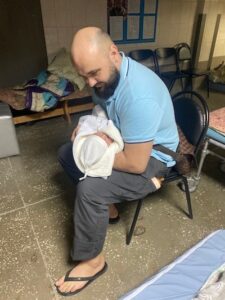A 25-year-old woman living in the Ukrainian capital Kyiv, started having contractions on 24 February, the day the Russian Federation launched a military offensive in Ukraine, and gave birth amid the sounds of air raid sirens. Her name is Mariia Shostak and she describes the harrowing conditions she endured, bringing a new life into a world of sudden and extreme danger.
This is Mariia Shostak’s story.
Mariia Shostak
“I had a complicated pregnancy so I went to the maternity hospital early so that the child and I would be under doctor supervision. When I woke up on 24 February, my phone’s screen was full of messages from relatives. Even before reading, I realized something had happened. The same morning, I had light contractions. In the afternoon, we were evacuated to the basement shelter for the first time. It was scary. At night, I did not sleep. The contractions intensified, and the news did not give peace.
In the early morning of 25 February, a doctor examined me and told me that I would give birth that day. I called my husband at home to come. A trip that normally takes 20 minutes took almost four hours because of queues at the gas station, shop and pharmacy.
I was lucky with the birth – it did not happen in the basement though some women gave birth in a room set up for this purpose. I started in the delivery room but had to be transferred to the operating room for a Caesarean section. Later, when air raid sirens went off, the medical staff wanted to evacuate me to the basement, but I refused. Because of the pain, I couldn’t even speak, let alone go anywhere. The rest of the time I was disconnected from the outside world, which was probably the only time I forgot about the war.
After the operation, I was in intensive care for several hours, no longer on anaesthesia. I was worried that I didn’t know where the baby and my husband were. Meanwhile, another air raid siren sounded, and I decided to go down to the basement. I was in a disposable shirt, without shoes, in a wheelchair, holding a urinary catheter. I was covered with a blanket and taken to the shelter, where I first saw my son. We named him Arthur.
I felt fear, fatigue and pain. The day after surgery, I went up to the maternity ward and back down to the basement several times a day. Again and again, the air raid siren sounded. I managed to sleep for an hour or two a day. We spent most of the time in the basement sitting in chairs. My back hurt from sitting, and my legs are still swollen as a pregnancy complication. Exhaustion blunted the fear until a projectile hit a high-rise building we could see from our window.

My husband, Yurii, helped me, taking care of me and the newborn. Medical staff organized meals in the bunker and later provided beds. They helped put the baby to the breast, shared medicine for babies, held my hand when I had a hard time walking.
I feel safe in the capital – there are enough shelters and timely information is coming from the authorities. My husband arranged a corner for us in the basement of our house to stay. I was born and raised here in Kyiv, I have no other home. We are not going to leave.”
Mariia Shostak is a 25-year-old woman living in Kyiv who started having contractions on 24 February, the day the Russian Federation launched a military offensive in Ukraine.
Image: Mariia Shostak via UNFPA

